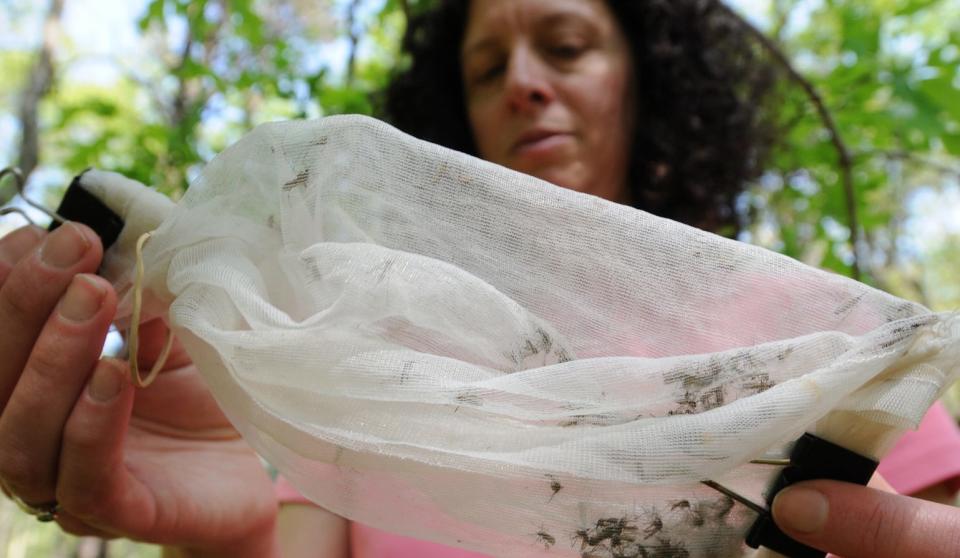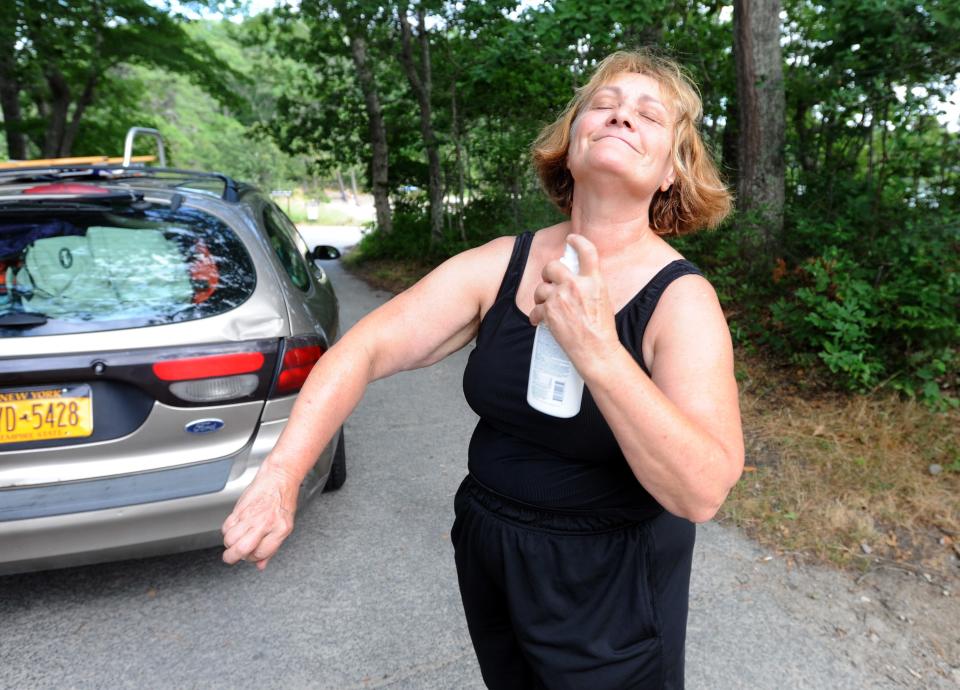Don't get bugged: How to keep mosquitoes from ruining your Cape Cod summer
Perhaps you should congratulate yourself.
You, and your blood, help future generations of mosquitoes prosper. And it's so darn easy to give back to these voracious flying vampires. Just walk outside and roll up your sleeves!
But maybe you don't like mosquitoes. After all, they are wicked annoying and creepy, and can ruin a cookout faster than a grill fire. And here's the frosting on the rotten mosquito cake: according to the state Department of Public Health, mosquitoes in our neck of the woods "can give you eastern equine encephalitis virus or West Nile virus."
Thus, it appears that avoiding mosquitoes and reducing their ability to reproduce close to your home makes a ton of sense. No one wants to be a mosquito pincushion! So, let's take a look at mosquito season on Cape Cod and figure out what we can do to limit unpleasant interludes with the swarming beasties.
Ticks on Cape Cod 'Tick aware, but not tick afraid.' What you need to know about ticks on Cape Cod

When does mosquito season start on Cape Cod?
As April begins to warm up on Cape Cod, overwintering mosquitoes begin to wake up.
"All they need is some warm weather to start flying and lay eggs," said Gabrielle Sakolsky, superintendent of the Cape Cod Mosquito Control Project. Around the same time, mosquito larvae in the water kick into development gear and the buzzy game begins anew.
Early April also marks the approximate time when mosquito control crews switch over from waterway clearing and brush removal to the application of larvicide, in an effort to get ahead of things.
Is there a mosquito forecast for the 2023 season on Cape Cod?
Sakolsky said that predicting how a mosquito season might go on Cape Cod is tricky business. A lot of it might depend on weather during the season that produces large amounts of standing water, or water areas that typically flow becoming stopped up, creating a better reproduction habitat for mosquitoes.
An inkling of what may be to come in 2023 can be gleaned from observations of mosquito control crews, who work around the Cape all year long.
"We are seeing more water in the swamps than the past couple of years," said Sakolsky.
What can you do around your house to help limit the presence of mosquitoes?
Developing a simple weekly routine can cut down unpleasant mosquito interaction around your home. Here is the mantra, according to the U.S. Centers for Disease Control and Prevention: "Remove Standing Water Where Mosquitoes Lay Eggs."
And here is the easy-as-pie CDC checklist:
Once a week, empty and scrub, turn over, cover, or throw out any items that hold water like tires, buckets, planters, toys, pools, birdbaths, flowerpots, saucers or trash containers.
Tightly cover water storage containers (buckets, cisterns, rain barrels) so mosquitoes cannot get inside to lay eggs.
For containers without lids, use wire mesh with holes smaller than an adult mosquito.
Fill tree holes to prevent them from filling with water.
If you have a septic tank, repair cracks or gaps. Cover open vent or plumbing pipes. Use wire mesh with holes smaller than an adult mosquito.
Right whales visit Cape Cod Right whales come up for air in Provincetown. Here's how to get a look from dry land.
What should I know about hiring a mosquito control company?
The U.S. Environmental Protection Agency has a handy tip sheet for folks who may be interested in hiring pest control professionals. Here are some of the EPA's tips:
Make sure the pest control operator’s license is current. Also, ask if the company’s employees are bonded, meaning that the company reimburses you for any loss or damage caused by the employee.
According to the EPA, "any company, including those advertising themselves as 'green,' should inspect your premises and outline a recommended control program," that takes these factors into consideration:
Pests to be controlled
Extent of the problem
Active ingredient(s) in the pesticide chosen
Potential adverse health effects and typical symptoms of poisoning associated with the active ingredient
Form of the pesticide and application techniques
According to the EPA: "If you hire a pest control firm to do the job, ask the company to use the least toxic chemical method available that will do the job."
Sakolsky said finding the source of problematic mosquitoes — the place they reproduce — is key to successful management.
"People want to do something like spraying, but until you get to the source, the effect may only be temporary," she said.

What should I know about applying mosquito repellent to my skin?
First, according to the EPA, there are things you can do to battle mosquitoes without using repellent:
"Dressing in light-colored clothing, long pants, and long sleeves, avoiding areas where mosquitoes are present, and taking other actions such as removing sources of standing water to prevent breeding can also help."
But, according to the CDC, when repellent time comes:
"Use Environmental Protection Agency-registered insect repellents with one of the active ingredients below. When used as directed, EPA-registered insect repellents are proven safe and effective, even for pregnant and breastfeeding women."
Picaridin (known as KBR 3023 and icaridin outside the U.S.)
Oil of lemon eucalyptus (OLE)
Para-menthane-diol (PMD)
2-undecanone
And, of course, read the product label thoroughly. Apply repellents on exposed skin or clothing — not underclothing. Don't use it near your mouth and eyes. If you are applying it to your face, first apply it to your hands and use them to apply the repellent to your face. Don't use repellent on wounds, cuts or irritated skin. Don't breathe in the spray or use it near food.
Now get out there and conquer some mosquitoes!
Eric Williams, when not solving Curious Cape Cod mysteries, writes about a variety of ways to enjoy the Cape, the weather, wildlife and other subjects. Contact him at ewilliams@capecodonline.com. Follow him on Twitter: @capecast.
Thanks to our subscribers, who help make this coverage possible. If you are not a subscriber, please consider supporting quality local journalism with a Cape Cod Times subscription. Here are our subscription plans.
This article originally appeared on Cape Cod Times: Tips to help avoid mosquitoes on Cape Cod

